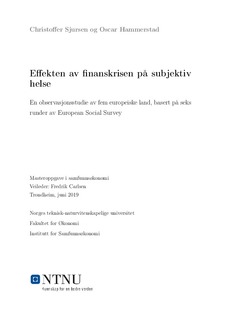| dc.contributor.advisor | Carlsen, Fredrik | |
| dc.contributor.author | Sjursen, Christoffer | |
| dc.contributor.author | Hammerstad, Oscar | |
| dc.date.accessioned | 2019-09-05T14:00:34Z | |
| dc.date.available | 2019-09-05T14:00:34Z | |
| dc.date.issued | 2019 | |
| dc.identifier.uri | http://hdl.handle.net/11250/2612748 | |
| dc.description.abstract | Denne masteroppgaven har benyttet seks utgaver av European Social Survey for å estimere kausaleffekten av finanskrisen i 2008 på helse. Eksisterende forskning har i stor grad sett på hvordan finanskrisen har påvirket helsen innad i ett enkelt land. Vårt bidrag til forskningen var derfor at vi studerte grupper av land samlet. Med bakgrunn i eksisterende forskning, benyttet vi subjektiv helse som helseindikator. Gruppene av land ble kategorisert på bakgrunn av arbeidsledighetstall under finanskrisen.
Problemstillingen vi ønsket å besvare var om land som hadde høy arbeidsledighet under krisen oppga dårligere helse enn land med lav ledighet. For å besvare problemstillingen benyttet vi difference-in-difference metoden, hvor Hellas, Spania og Irland ble brukt som behandlingsgruppe. Norge og Belgia ble benyttet som kontrollgruppe. Innledningsvis benyttet vi en enkel difference-in-difference modell med kontrollvariabler. Denne modellen ble videre utvidet med en lineær trend, for å tillate for gruppespesifikke trender i helse. Som en ekstra robusthetsanalyse ble propensity score matching kombinert med diff-in-diff gjennomført. Ettersom vi i tillegg var interessert i å se om finanskrisen hadde ulik effekt på subgrupper i landene ble dette også undersøkt.
I strid med tidligere forskning indikerte våre funn, at finanskrisen ikke hadde signifikant effekt på subjektiv helse. Dette resultatet var konsistent over alle modellene som ble forsøkt, for gruppene som helhet og for subgrubbene som ble undersøkt. | |
| dc.description.abstract | This master thesis has used six waves of the European social survey to estimate the causal effect of the 2008 financial crisis on health. While previous research has mainly focused on how the financial crisis affected health within a single country, our study focused on a combined group of countries. Based on previous research, our study used self-reported health as an indicator of health. Groups of countries were categorized based on unemployment rates during the financial crisis.
The research question we wanted to answer was whether countries with high unemployment during the crisis reported poorer health than countries with low unemployment. To answer this question, we applied various difference-in-difference methods, where Greece, Spain and Ireland were used as a treatment group. Norway and Belgium were used as a control group. Initially, we used a simple difference-in-difference model with control variables. This model was further expanded with a linear trend to allow for group-specific trends in health. As an additional robustness check, propensity score matching was combined with diff-in-diff. As we were also interested in examining whether the financial crisis had different effects on subgroups within countries, this was also investigated.
Contrary to previous research, our findings indicated no significant effect of the financial crisis on self-reported health. This result was consistent across all models, on population level as well as for the subgroups examined. | |
| dc.language | nob | |
| dc.publisher | NTNU | |
| dc.title | Effekten av finanskrisen på subjektiv helse | |
| dc.type | Master thesis | |
